What your cravings tell you about your nutrient supply.
Cravings are the irrepressible urge for something sweet, salty or fatty. It comes suddenly and is hard to bear. In most cases, this is your body’s way of telling you that it lacks vital nutrients.
When does cravings occur?
Cravings are especially typical after physical or mental exertion, when there are too long pauses between two meals, or during growth phases such as teenage years or pregnancy. Cravings also often occur when cortisol levels are high due to too much stress or lack of sleep.
In individual cases, ravenous appetite can also indicate a disease, e.g. diabetes or hyperthyroidism. Therefore, it is important to possibly clarify these causes with a doctor.
Cravings: what you can do
If your cravings are due to a nutrient deficiency, you should address them as soon as possible. Eating a balanced diet, eating regular meals, getting enough sleep, balancing stress and taking targeted supplements can all help you.
Balanced diet
In your diet, prefer foods that provide you with long-lasting healthy energy, such as whole grains, fruits and vegetables, and legumes. Organic foods are worthwhile because they are healthier and more nutritious than conventionally grown foods.
If you can’t manage that, incorporate a good organic multivitamin into your day as a supplement to provide a daily nutritional foundation and take the pressure off.
Regular meals
Skipping meals means starvation and lack of nutrients for your body. The result is often cravings and eating more than you actually need. So don’t skip a meal to avoid cravings in the first place.
Sufficient sleep
Studies show: poor sleep and lack of sleep increase cravings for unhealthy, fatty foods. This is because your cortisol levels (=stress hormones) increase when you don’t sleep enough. This stimulates the appetite unnecessarily. Sleep at least seven hours per night.
Balance stress
During stressful periods, the body produces more cortisol, a hormone that is supposed to protect the body and bring more energy. However, the increased cortisol level also increases blood sugar levels. This stimulates the appetite. So when you’re stressed, balance it out with relaxation techniques like yoga, support your body with adaptogens, or go for a walk to reduce cravings.
You can learn how to lower your cortisol levels in the article “Lowering Cortisol: How to Beat Stress and Fatigue.”
This is what your chocolate cravings mean
There is a lot of magnesium in the cocoa bean. So if you’re craving chocolate, your body may be signaling a magnesium deficiency.
Magnesium is an anti-stress mineral needed for more than 600 biochemical reactions in the body. Your body cannot produce it itself. He needs this vital mineral every day.
Magnesium supports nerves and psyche, is important for muscle relaxation, supports a healthy immune system, keeps your heart rate steady, and even helps your bones stay strong.
A magnesium deficiency is unfortunately very common. Therefore, you should check if there are any other symptoms that might indicate this. For a comprehensive list of all symptoms (even unusual ones), see our article “Magnesium Deficiency, Causes, Symptoms and Solutions.”
To address magnesium deficiency, you should supplement your diet with a magnesium supplement(e.g., Calm A Lama Plant-Based Organic Magnesium by Ogaenics). You’ll soon be able to enjoy chocolate again without cravings.
-
Bestseller
Calm A Lama
Organic magnesium from premium green algae extract for effective regeneration of muscles and nerves44,90 €1.076,74 € / kg
-
Set 2x Calm A Lama | Plant-Based Bio-Magnesium
2-pack of organic magnesium from premium green algae extract for effective regeneration84,90 €89,80 €1.076,74 €1.017,99 € / kg
This is what your craving for sweets means
If you regularly have afternoon lows with cravings for sweets and caffeine, it’s a sign that you’re suffering from elevated cortisol levels.
Cortisol is the stress hormone that makes your body perform at its best when you’re stressed. But it also throws your blood sugar levels out of balance, leading to cravings.
Fortunately, nature has help at hand: If you can’t get to relaxation exercises and walks because of stress, certain plant extracts, so-called adaptogens, such as ashwagandha and saffron, can help.
Adaptogens bring your body back into balance. They lower cortisol levels and calm the psyche and nerves, reducing your sense of stress. You can find them, for example, in the Adapto Genie Balancing Complex. So cravings for sweets will soon be a thing of the past.
-
Bestseller
Adapto Genie
Bio Balancing Complex with premium KSM-66® Ashwagandha, Safr'inside™ saffron extract, B vitamins74,90 €2.547,62 € / kg
-
Set 2x Adapto Genie | Balancing Complex
2-pack balancing complex with premium KSM-66® ashwagandha, Safr'inside™ saffron extract, B vitamins143,90 €149,80 €2.547,62 €2.447,28 € / kg
This means your cravings for fatty foods
Cravings for fatty foods are often an unmistakable signal that your body needs good fatty acids, which you can find in fish or nuts, for example. However, it may also indicate a calcium deficiency, since calcium is found primarily in high-fat dairy products.
If you don’t eat these foods in sufficient quantities every day, you should supplement these nutrients. You can find high quality fatty acids e.g. Oilalala Skin Omega Complex, calcium in Bone Nanza Bio-Calcium Complex.
-
Bestseller
Bone Nanza
Organic calcium complex from organic red algae plus natural magnesium and vitamin D3ab 29,90 €
This is what your craving for fruit means
Cravings for fruit are one of the best types of cravings you can have. Fruit is packed with vitamins, minerals and antioxidants that your body needs every day.
As long as you don’t eat so much that your total calorie intake increases to an unhealthy level, that’s perfectly okay. But if your cravings are due to the fact that you usually always eat too little fruit in everyday life, your body definitely needs more vitamins, minerals and antioxidants.
A daily multivitamin can make up for your deficiencies. This can take the pressure off you to always eat perfect meals. Your basic supply of all important nutrients and antioxidants is then already ensured in the morning.
The nutrients it contains also support your hormone balance and a balanced blood sugar level.
-
Bestseller
Mr Do-It-All 18+
Organic Multivitamin Complex Premium for men between 18 and 44, All-In-One79,90 €2.069,95 € / kg
-
Bestseller
Mr Do-It-All 45+
Organic Multivitamin Complex Premium for men aged 45 and over, All-In-One79,90 €2.048,72 € / kg
-
Bestseller
Mrs Do-It-All 18+
Organic Multivitamin Complex Premium for women of fertile age, All-In-One!79,90 €2.302,59 € / kg
-
Bestseller
Mrs Do-It-All 45+
Organic Multivitamin Complex Premium for menopausal women, All-In-One!79,90 €1.997,50 € / kg
-
Bestseller
Mrs Do-It-All 55+
Organic Multivitamin Complex Premium for women after the menopause, All-In-One!79,90 €1.997,50 € / kg





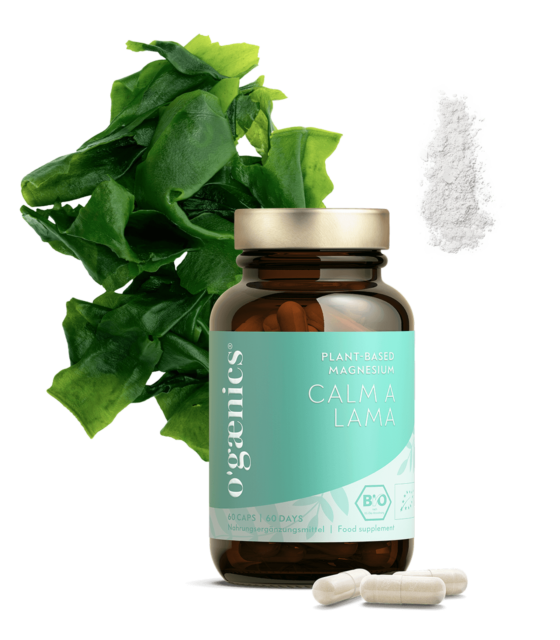










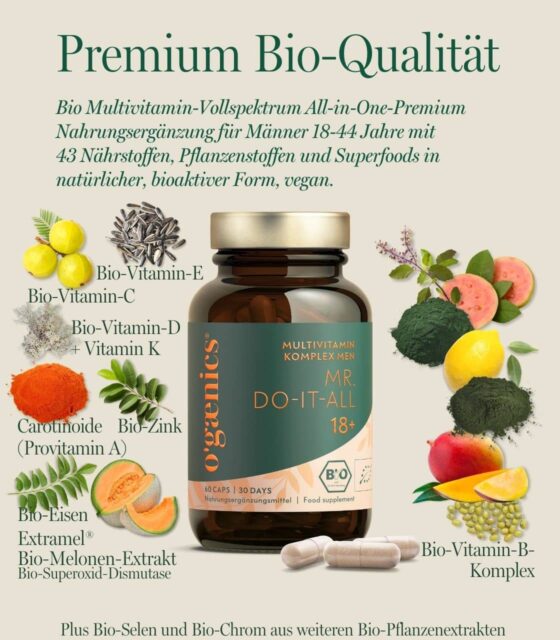
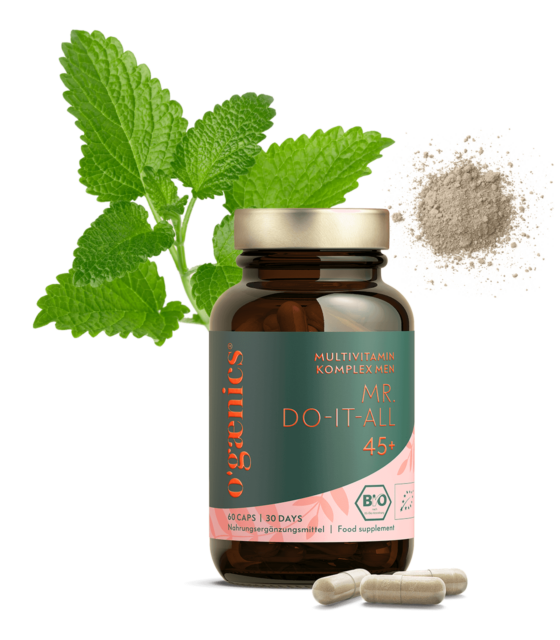

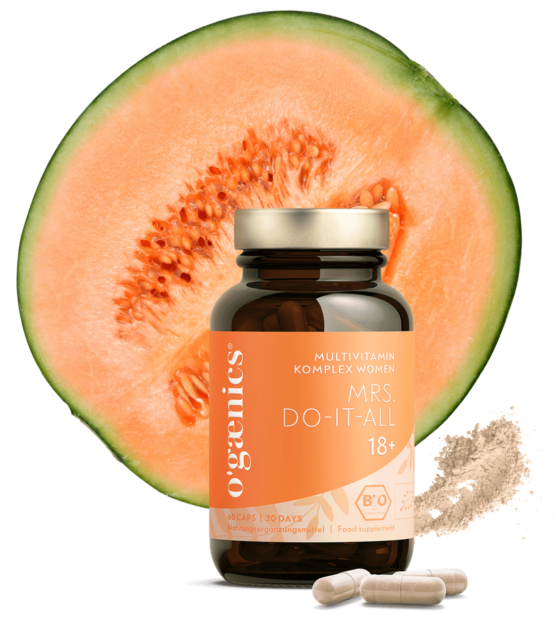
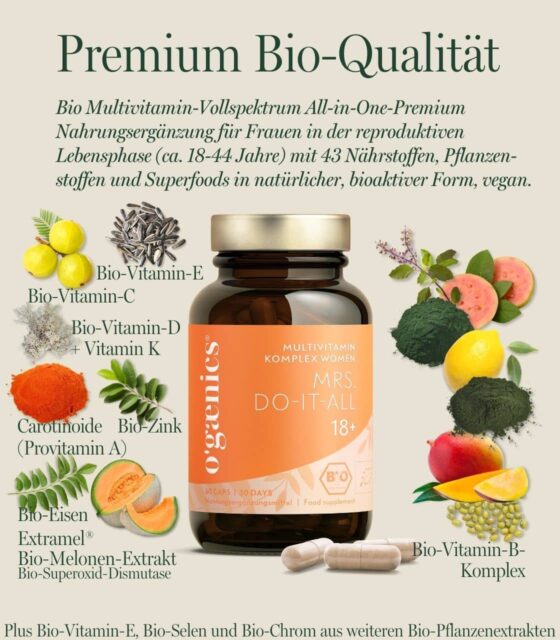
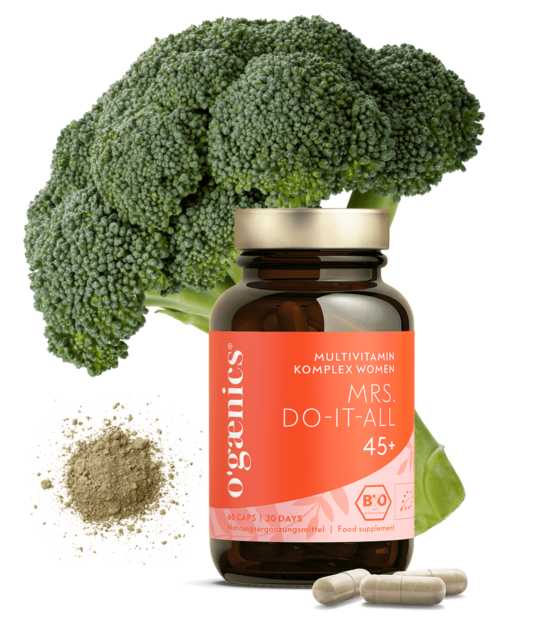

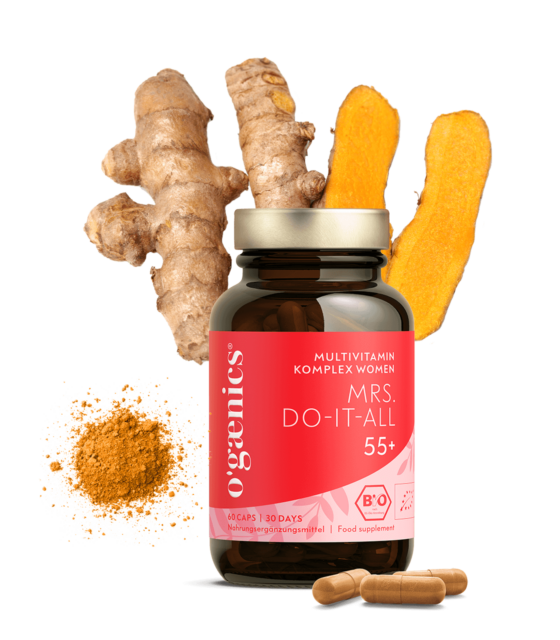

 No products in the cart.
No products in the cart.